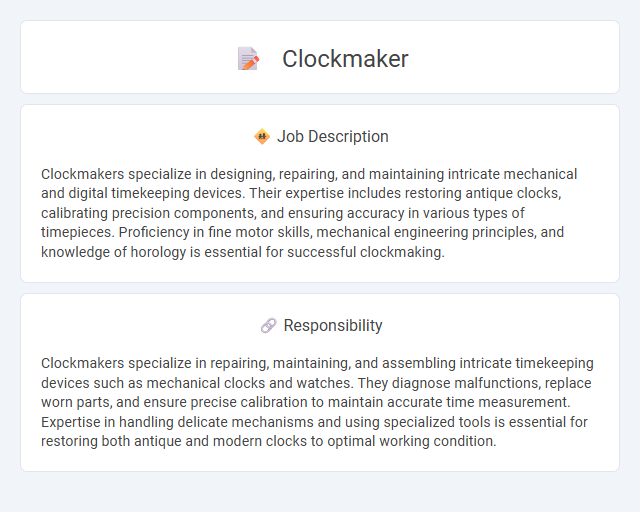
Clockmakers specialize in designing, repairing, and maintaining intricate mechanical and digital timekeeping devices. Their expertise includes restoring antique clocks, calibrating precision components, and ensuring accuracy in various types of timepieces. Proficiency in fine motor skills, mechanical engineering principles, and knowledge of horology is essential for successful clockmaking.
Individuals with strong attention to detail and steady hands are likely well-suited for a clockmaker job, as precision and delicate craftsmanship are essential. Those who prefer repetitive, focused tasks and can work patiently without frustration may find this profession compatible with their skills and temperament. Conversely, people who struggle with fine motor skills or have difficulty concentrating for extended periods probably would not thrive in this role.
Qualification
Clockmakers require specialized training in horology, often obtained through technical schools or apprenticeships that emphasize mechanical and electronic timekeeping systems. Proficiency in precision hand tools, intricate repairs, and detailed assembly of clock components is essential for ensuring device accuracy and longevity. Strong problem-solving skills and knowledge of historical and modern clock mechanisms enhance a clockmaker's ability to restore and maintain timepieces effectively.
Responsibility
Clockmakers specialize in repairing, maintaining, and assembling intricate timekeeping devices such as mechanical clocks and watches. They diagnose malfunctions, replace worn parts, and ensure precise calibration to maintain accurate time measurement. Expertise in handling delicate mechanisms and using specialized tools is essential for restoring both antique and modern clocks to optimal working condition.
Benefit
A career as a clockmaker likely offers the benefit of honing intricate mechanical skills that can enhance problem-solving abilities. The job probably provides satisfaction from restoring and maintaining valuable or antique timepieces, appealing to those with a passion for craftsmanship. Financial stability may be attainable through specialized services that are consistently in demand across various markets.
Challenge
Clockmaker jobs may often present intricate challenges involving the precise repair and restoration of delicate timepieces. The probability of encountering complex mechanical issues requires a deep understanding of various clock mechanisms and meticulous attention to detail. Problem-solving skills and patience are likely essential to successfully address the technical difficulties inherent in this highly skilled craft.
Career Advancement
Clockmakers develop expertise in repairing and restoring intricate timepieces, advancing from apprentice roles to master craftsmen with specialized skills in horology. Career progression often includes positions such as senior clockmaker, workshop manager, or roles in luxury watch brands and heritage conservation projects. Continuous learning in mechanical engineering, micro-mechanics, and emerging smart timekeeping technologies enhances opportunities for leadership and consultancy within the horological industry.
 kuljobs.com
kuljobs.com